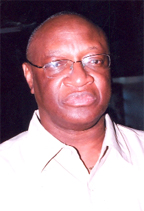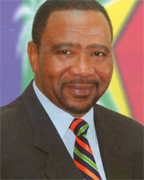PNCR leader Robert Corbin is denying holding talks with party executive Dr Aubrey Armstrong to facilitate a transfer of leadership.

Corbin has also left open the possibility about his candidacy to continue in the post, saying that the question of his “electability” is for the judgement of members and supporters, who will decide the direction of the party at its upcoming Biennial Congress.
He made the statements following questions raised about the outcome of a leadership retreat held by the party last weekend. The retreat was coordinated by Lance Carberry, Alan Munroe and PNCR General Secretary Oscar Clarke, while the main facilitators were Dr Armstrong and Dr. Ivor Mitchell.
Online news site demerarawaves.com reported that Corbin, Barbados-based executive Armstrong and Mitchell had held talks on the sidelines of the retreat to explore the possibility of Armstrong becoming the next party leader. It also said party insiders indicated that an agreement had been reached that Corbin would not contest the position of leader at the congress and Armstrong would emerge as the favourite and eventually leader, likely paving the way for Winston Murray to return as chairman of the party. Sources have told Stabroek News that Corbin was likely to resist any calls to contest for leadership and would likely endorse Armstrong’s candidacy. Armstrong, sources said, is being favoured to helm the party because he is without the weight of political baggage that is believed to have stymied Corbin’s attempts to steer the party forward. However, there is also some scepticism over Armstrong as he has not been resident here for some time and does not command strong grassroots support. There has been similar reservation about former health minister Dr Richard Van West Charles, who has also expressed a desire to contest for the party leadership.
However, Corbin said on Friday that the reports were inaccurate and that no such conversation took place at the retreat. For its part, demerarawaves is sticking to its story.
Meanwhile, addressing the question of whether a new leader could emerge, Corbin recalled a declaration he made that the PNCR would not have progressed in its goal to reform itself if the leadership featured the same faces by the next congress. He had also said the party should be moving to build a new cadre of leadership. “Many of us have been there for a long time,” he noted, adding, “we believe it is time for us to be handing over this party to a reinvigorated, revitalised group so that they could take the party forward.”
But he did not want to predict the outcome of the congress in advance. Turning to the issue of his own electability, Corbin insisted that it was for the judgement of party membership and supporters, refusing to divulge his own feelings on the matter. However, he sought to debunk the notion that the party leader is the sole person responsible for formulation and execution of policy, noting that there is leadership at several levels. “It is a mistake to think that any one person could change or direct the affairs of the party,” he said. “Even if the membership decides at the next congress to have another leader, that leader would have the same constraints and scope.”

Corbin argued that the party leader is just “a cog in the wheel” and declared that no one is indispensable. Further, he reminded that the PNCR has shown that it has been able to survive with or without any one individual, pointing to its resilience following the passing of two successive leaders in office, late President Forbes Burnham and Desmond Hoyte. “I have no doubt the PNC will survive whether I am leader or anyone else is leader,” Corbin emphasised, saying that it is the collective responsibility of the party membership to ensure the successful implementation of its policies.
Seventy participants from the PNCR’s Central Executive Committee, Members of Parliament and representatives from all ten regions attended the major strategic leadership retreat, which was focused on “the transition and change needed in the party” against the backdrop of threatening storm clouds on the global, regional and national horizons.
Among resource persons were party veterans like Haslyn Parris, Cammie Ramsaroop and intellectuals including Professor Clive Thomas and Brigadier (ret’d) David Granger. Representatives of civil society, trade unions, religious organisations, youth groups and the diaspora were also invited to share their perspectives.
The retreat considered the current state of the PNCR, the leadership structure, the party organisation, reaching out to non-traditional communities and increasing its membership from among young people and women. Additionally, the relationship of the party with the labour movement and NGOs was also examined. It was generally agreed that the process of reform must be deepened while the party must be reinvigorated and modernised. To this end, a number of solutions were proposed and the Central Executive would be responsible for implementing them, in the near future. Among the decisions is to improve the working relationship between regional groups, given its importance to national development.
Over the last two years, the PNCR has experienced internal turmoil following the aborted challenge by former vice-chairman Vincent Alexander to Corbin’s leadership. Subsequently, several Alexander supporters were disciplined and James McAllister was recalled from Parliament. In the wake of the departure of several leading party members it was also recently announced that Murray had given up the post of chairman on a matter of principle though he remained a Member of Parliament and the party’s shadow finance minister.
The party has also faced piercing questions about its stance toward the government and whether it was providing effective leadership of the opposition. Corbin has been accused of taking a soft line on the government and this at one point led to President Bharrat Jagdeo rising to his defence. Corbin has recently reiterated the party’s long-held view that shared governance is a must if Guyana is to progress.
